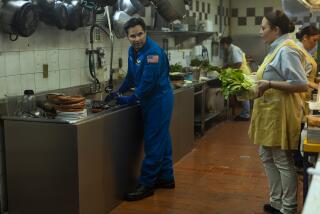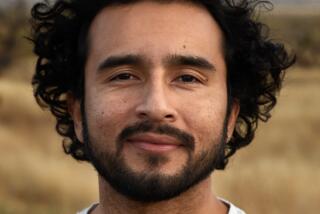EARTHQUAKE / THE LONG ROAD BACK : Rescued Man Describes 7-Hour Ordeal : Survivor: As tons of concrete fell on him, Salvador Pena says, he thought of his wife and five children, and put himself ‘in God’s hands.’
- Share via
As two floors of concrete tumbled onto him, Salvador Pena recalled Wednesday, his thoughts turned to his family--his five children and his wife, whom he has struggled to support since leaving war-torn El Salvador for Los Angeles a dozen years ago.
“I thought that I was going to die, and my family needs me so much,” Pena said in his first public comments since his rescue from beneath the rubble of the Northridge Fashion Center’s parking structure, which collapsed in Monday’s earthquake. “I’ve always fought to give them food, give them a little strength to sustain themselves.”
Pena, 43, was operating a power sweeper on the garage’s first floor when the quake struck. The building collapsed, trapping Pena beneath 20 tons of concrete. Rescuers worked seven hours to free the janitor from the debris in a dramatic scene that was broadcast live.
The janitor’s ordeal has become one of those tales of miraculous survival that inevitably surface during catastrophes, transforming individuals such as Pena into symbols of hope and perseverance.
“He is truly lucky to be alive,” said Dr. Michael J. Zinner, chief of surgery at UCLA Medical Center, where Pena remains hospitalized in serious condition.
The debris crushed Pena’s legs and his right hand, also slicing a gash behind his left knee. He still has only limited feeling in both legs, but doctors say amputations probably will not be necessary. Physicians are optimistic that Pena’s limbs will respond to treatment.
On Wednesday, though, Pena--a devout Roman Catholic wearing a rosary around his neck--left no doubt that he believed his complete recovery was imminent. He seemed cheerful.
“I feel very content, very happy to have this new life,” the thankful janitor told journalists during a brief interview from his bed in the hospital’s intensive care unit. “I had faith (then), and I have faith now that I will be well.”
As the garage shook, Pena recalled, he quickly realized there was no time to escape.
“It happened so fast, I wasn’t able to do anything,” he said. “I put myself in God’s hands.”
While thanking God, Pena also effusively praised the firefighters, paramedics, physicians and others who saved him. He seemed taken aback by his sudden celebrity.
“All this interest, all this fuss about a person who is so humble and simple,” Pena said.
Standing by his bedside was his younger sister, Martha Pena de Tejada, a mother of two who recognized her brother while watching television accounts of the rescue at her home in Oakland. Also visiting was his eldest son and namesake, Salvador Remberto Pena, a 24-year-old electronics worker who lives in Downey.
“My father always worked hard to take care of his family,” the son said. “He wants to get back to work.”
The janitor’s life story, sketched from interviews, seems emblematic of those of so many new immigrants.
Pena is a native of El Salvador’s Chalatenango province, site of some of the fiercest fighting during the recent civil war that sent Pena and hundreds of thousands of his compatriots fleeing north.
His years of toil in the low-wage immigrant work force have financed the care and education of his five children, four of whom remain in El Salvador along with Pena’s wife, Gloria de Pena. The two eldest daughters are university students. To economize, Pena shares an apartment in Los Angeles’ Westlake neighborhood--a hub for newcomers from Central America--with three other immigrants, his son said. It is a common survival strategy for those supporting families back home.
Asked what he most wanted when he left the hospital, Pena didn’t hesitate: a plate of good pupusas, the Salvadoran delicacy, he said.
More to Read
Sign up for Essential California
The most important California stories and recommendations in your inbox every morning.
You may occasionally receive promotional content from the Los Angeles Times.













